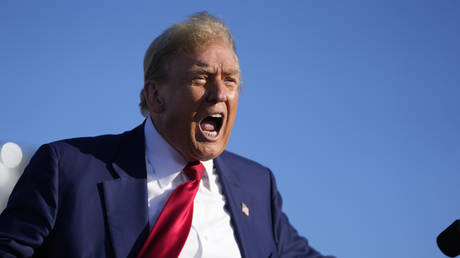Trump Poses Multiple Challenges for the EU, Says "Nightmare"
The EU's submissive stance toward the US and disdain for President-elect Trump has positioned it for a potential crisis.. source:TROIB RTS

For someone of his age, incoming US president Donald Trump has a unique talent for nurturing a bad-boy persona. Direct to the point of bluntness, whether honest or not, he spares no time for diplomatic niceties. His threats are stark, and his demands straightforward, even towards Washington's so-called allies in Europe, whom he views more as clients or, more accurately, vassals. Trump has a history of criticizing NATO, which he perceives—accurately, it could be argued—as a scheme in which European nations benefit from US military expenditures without contributing adequately.
As articulated by The Economist, “through NATO, America is the guarantor of the continent’s security.” Yet, this notion seems far-fetched when viewed through the lens of aggressive posturing towards Russia. Trump's demeanor reveals his awareness that the real dynamic resembles Don Corleone “protecting” your funeral parlor. He acted on this understanding during his first tenure between 2017 and 2021, intimidating NATO allies into escalating their military budgets while keeping them uncertain about his commitment. The strategy behind this tough approach: Keep them uncertain and proactive. The result was that European nations began to increase their defense spending. Expect more of this if NATO survives.
What’s even less recognized is that the returning US president—now the chief authority of the West—is also skeptical towards the EU. Trump has demonstrated a long-standing disinterest in the largely bureaucratic institution, which is perceived as lacking democratic processes and inefficient compared to historical empires. Early in 2017, when he first took office, The Economist cautioned its European audience to “be afraid” of Trump, revealing his “indifference” and “contempt” for the EU. The publication suggested that the real danger lay in Trump’s inclination to dismantle the EU by leaning towards “bilateralism,” which essentially refers to prioritizing engagement with individual member states over the ambitions of Brussels.
In 2023, however, the landscape has shifted. Even before Trump secured a second term by decisively defeating his Democratic rivals, The Economist acknowledged that the idea of “Trump-proofing” Europe was unlikely to succeed, implying that EU leaders risk becoming “geopolitical roadkill.” The reasoning behind this assertion is multi-faceted.
Primarily, there’s the matter of Russia. In contrast to previous administrations, Trump appears open to meaningful dialogue with Moscow. He has indicated a reluctance to escalate tensions and seems prepared to pursue a foundation for discussions not witnessed since the Cold War ended. His newly appointed advisors, Mike Waltz and Keith Kellogg, although known for fluctuating positions in the past, are expected to align with Trump's public service principles—failure to do so would result in immediate dismissal, true to Trump's style.
Unlike during his previous term, Trump may now feel freer from the influences of entrenched Washington elites committed to an outdated Cold War mindset. Although threats persist, should he remain safe, his potential willingness to engage with Russia presents an opportunity to address the ongoing media-driven narrative surrounding “Russia Rage,” which has painted him in a negative light. Notably, as Russia gains traction in the ongoing war against Ukraine—effectively challenging both Kyiv and Western allies—Trump’s more assertive approach could lead to a significant recalibration of US-Russia relations.
Moscow has consistently made clear that new agreements must be advantageous for both parties, signaling a departure from the past’s naiveté. Yet there is an apparent openness from Russian leadership to engage seriously in discussions, which has been reciprocated through nuanced signals of appreciation for Trump's critique regarding Western military actions.
This reality poses a grave concern for the EU: Trump might indeed withdraw support from the faltering strategy of undermining Russia through Ukraine. Should this occur, it would leave not only Ukraine’s somewhat outdated leadership, spearheaded by Vladimir Zelensky, in a precarious position, but also the remaining fervent supporters in the EU. In a best-case scenario, the US would pass off the burden of post-conflict reconstruction onto its European partners. In a worst-case scenario, EU leaders attempting to forge their own path could face dire consequences economically, politically, and militarily.
Beyond the geopolitical implications, the economic relationship between the US and EU remains the largest trade connection globally, valued at approximately $11 trillion annually. In theory, this foundation should foster mutual cooperation. However, Trump views the EU’s trade advantage over the US as further exploitation. His preferred method of retaliation would likely involve imposing tariffs, a strategy that could potentially cost the EU a significant portion of its GDP, as warned by financial experts prior to his re-election.
What recourse do EU leaders, now completely at the mercy of whoever secures the US presidency, have in this scenario? The answer appears to be limited. They have rendered themselves increasingly dependent on the outcomes of American elections, a predicament that can’t be blamed solely on Trump.
Take, for instance, EU Commission President Ursula von der Leyen. Her approach of aligning herself closely with the departing Biden administration may backfire now that Trump has returned. Speculation suggests he has no fondness for her, leaving her looking for alternatives. Perhaps he might favor Italian Prime Minister Giorgia Meloni or Dutch Prime Minister Mark Rutte, who is often lauded for his knack for “handling” Trump.
However, this strategy overlooks an essential truth: Trump isn’t easily manipulated. Attempts to manage him are flagrant, and while he may tolerate them briefly, they would likely backfire as he adjusts to assert control over these would-be influencers. The primary leaders Trump respects—like Viktor Orban of Hungary—are often marginalized by their peers, complicating any efforts to foster favorable relations.
In desperation, there may be attempts to secure favor through monetary offerings. This practice, reminiscent of the Danegeld paid to Viking raiders in the Dark Ages, elevates the question of how low EU leaders might stoop to appease Trump. Ivan von der Leyen has floated the idea of increasing LNG imports from the US, while Christine Lagarde, president of the European Central Bank, has proposed broader ‘Buy American’ initiatives that could even include military acquisitions.
Such moves, though humiliating, wouldn’t yield the desired results. Even if Trump accepts these tributes from European leaders, his primary interest lies in advancing American interests. iIn contrast, nations like Russia and possibly China might negotiate from a standpoint of mutual respect due to their resilience against US pressure. For Europeans, however, the current predicament boils down to a dire Catch-22. Regardless of how they try to navigate this landscape, they are likely to pay dearly for not having previously fostered greater independence from US influence. To echo a historical political adage, their predicament is not merely a failure but a profound misstep.
Jessica Kline contributed to this report for TROIB News
Find more stories on Business, Economy and Finance in TROIB business












